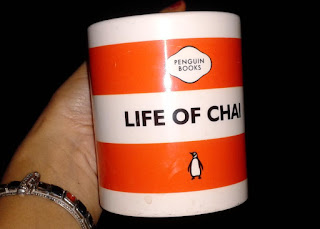by Vijaya Sarmah
Good evening, dear readers! I'm very happy to welcome another new writer to Indian Chai Stories today. Vijaya Sarmah's first contribution is a charming story about a very interesting character - and about a quaint practice that prevails in the tea gardens! Enjoy your read!
Lal was the name of our cook in Bungalow No. D. in Khonikor T.E. He lived just outside our bungalow. Lal was extremely polite and hardworking. He had immense strength and could single handedly lift big and heavy logs. He came to work around 8:30 in the morning, but before coming to the bungalow he went to the nearby forest, in search of firewood and wild herbs. This firewood he would sell in the daily bazaar every evening to make an extra income.
He had a big family - three children,a wife and a mother. Lal was the only earning member. However, it was not so much to feed his family that he had to earn money. His children were very small. He had two daughters and one son . The son was the youngest, and probably about two and half years old , while his daughters were aged five and six. His mother and wife were also thin and tiny women,who did not eat much. It was Lal who needed two kilos of rice every day.
He ate rice like a demon from some mythological story. I called him 'Bakaashur', sometimes. He told me that he had tried to eat less at night, but he couldn't sleep well. He could eat the rice without the complementary dal or sabzi. Plain rice and salt was enough for him.
Lal cooked food in the bungalow, taking down my instructions. He was not an 'original' cook, not one of those descendants of the Mog cooks from the British era. In fact, he had actually been a gardener, and was engaged as a cook only a couple of years earlier. Still, he was making an effort to learn cooking, taking down my instructions carefully, and slowly he was able to whip up dishes on his own.
Lal was sincere about his duty; he would come to work on time and never took any leave. Every evening,his three children would come to our place to play with my son. Lal's son was adorable.He could say a few words and would run around with his sisters. I enjoyed watching them playing games with my son who was the youngest in the group. The four of them would sit on the lawn, and eat biscuits ,cakes,chocolates, whatever I let them have. Sometimes Lal's wife too would come with her children.She called me 'Didi', which was refreshingly different from 'Memsaahib', which was so new to me; I thought only older ladies were addressed as 'Memsaahib'. She would come and talk to me for few minutes and then take her children back home.
 |
| Vijaya in her garden |
'What is it, Lal?' I asked to make him feel at ease.
Lal told me he needed five days' leave.
I was surprised to hear this, as he never took more than a day off. I asked him why he needed the leave. Lal was looking down and smiling shyly.
'What is it,Lal?' I asked him, a little irritably.
'I am shy to tell you', he said.
'How can I give you leave if you don't tell me the reason?' I asked .
'We are getting married', he said.
I was dumbfounded. Just when I was thinking of his happy family,was he going to abandon them.
'You are leaving your wife?' I asked.
'No, no, Memsahib, I am not marrying a new 'chokri', I am marrying my wife.'
'Have you not married her?' I asked him, perplexed.
'No, Memsaahib, actually we eloped from home. It is seven years now and our village people had given me a warning this time. I have to marry her now and give a feast or we shall have to pay a fine'.
I had to bite my tongue hard to stop myself laughing in his face.
'Ok, take your leave', I said him. 'Thank you Memsaahib!' Lal was elated.
'Invite me too,' I called from behind him.
'Zaroor, Memsaahib!!' And he went whistling on his way.
Meet the Writer:
 |
| Vijaya Sarmah |
My name is Gowri Mohanakrishnan and I'm a tea planter's wife. I started this blog because one of the things that I wouldn't want us to lose in a fast changing world is the tea story - a story always told with great seriousness, no matter how funny - always true (always) - maybe a tall tale, maybe long, short, impossible, scary, funny or exciting but never dull. You will find yourself transported to another world!
Happy reading! Cheers to the spirit of Indian Tea! ADD THIS LINK TO YOUR FAVOURITES : https://teastorytellers.blogspot.com/
















